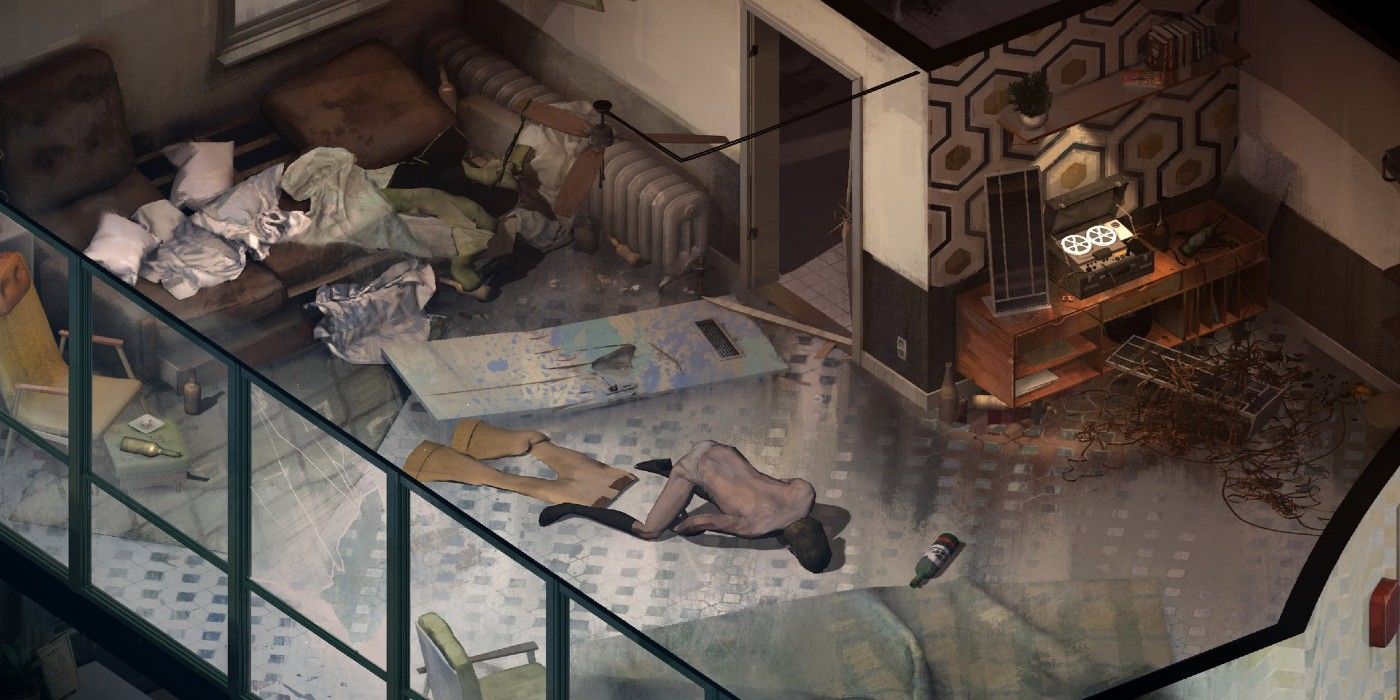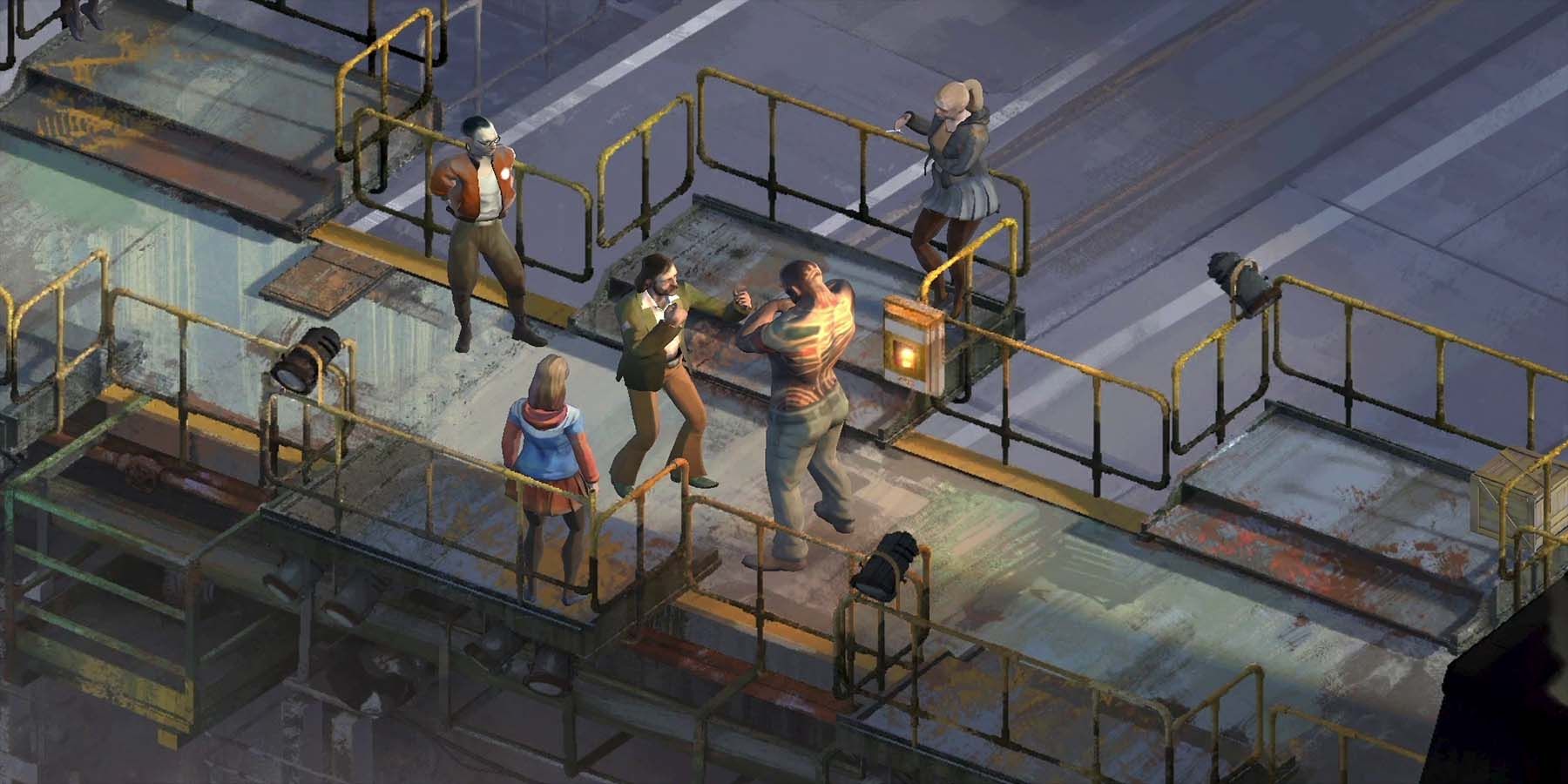Disco Elysium has been a huge hit since its release in 2019, with fans praising everything from its innovative gameplay, to its melancholy soundtrack. But one of the other aspects of the text-heavy RPG that critics and gamers have lauded is its success in creating a strong emotional connection between the player and the game’s troubled protagonist, Harry DuBois.
Despite beginning Disco Elysium’s rich and complex story in the role of a drunken loser, players and reviewers have claimed that Harry’s character development was genuinely moving. The game uses a number of skillful storytelling techniques to forge this sympathetic bond.
RELATED: Disco Elysium Update Makes Fonts Bigger, Cleans UI, and Reduces Overall Install Size
Disco Elysium's Protagonist is the Opposite of a Power Fantasy

Harry begins the game as an amnesiac, having abused drugs and alcohol so enthusiastically that he has wiped his own memory; not only of his name and his past, but also of the world he inhabits. This is an intelligent storytelling artifice, and many other games have featured characters with memory loss because it enables the developer to introduce and explain the game world without breaking immersion. Players learn at the same time as the protagonist does.
However, Harry’s blank memory is tied to his status as possibly the biggest loser in video gaming history. Not only is he a hopeless drunk, but he is also an abject failure as a police officer, having spent a week allegedly investigating a murder without even bothering to remove the body from the crime scene. In a particularly dark twist, fans noticed that the clothes Harry has strewn about his hotel room include a tie wrapped around the ceiling fan, possibly indicating that he has attempted suicide.
Early scenes in the game double down on this wretched introduction to the main character, with Harry humiliating himself by forgetting his name in front of new partner Kim Kitsuragi, and being bullied by a foul-mouthed child. If Harry looks in a mirror, players are introduced to "the expression": a desperate, trying-too-hard grin that seems to scream "please, someone, like me."
Disco Elysium really does portray its protagonist as the ultimate underdog. This makes players really root for Harry and to view even the tiniest successes, like finding out his name and police rank, feel incredibly meaningful and important. They aren't just guiding a character to the game's conclusion, but aiding him in his recovery and rehabilitation.
Further pathos arrives as players learn more about Harry’s past, including the sad end of his marriage and the crippled psychological state laid bare by his drinking and the drug abuse that saw Disco Elysium temporarily banned in Australia. He is not only a loser, but he knows it, and seems to no longer care whether he lives or dies. The last words anyone remembers hearing from his hotel room after his ill-fated pre-game bender are "I don’t want to be this kind of animal anymore!" Harry's tragic back story resonated deeply with fans, including those who have suffered from depression or other mental health issues.
Other Ways Disco Elysium Makes Its Players Care

The slow-burn blossoming of Harry’s relationship with Kim is another source of immense poignancy. Kim seems initially disgusted with his incompetent new partner, but reveals himself to be an extremely tolerant and kind-hearted man, putting up with Harry’s frequent missteps while gently guiding him towards better moral stances. Kim even compliments him on every breakthrough, as the duo unravel Disco Elysium’s central mystery. The kindness with which Kim treats his friend, as well as the police officer’s straitlaced charisma, worked perfectly as a foil for troubled and unpredictable Harry.
Another way in which Disco Elysium cleverly enhances the connection between the player and its main character is by allowing him the flexibility to mirror the player’s own personality. This is not limited to traditional character creation choices such as Harry’s appearance, or whether to be a gun specialist or a melee fighter, but instead allows players to craft an avatar who approaches the game’s challenges in a way familiar to them.
Harry can utilize brains or brawn to outsmart or intimidate his way through difficult encounters, and can adopt either a confident or introverted approach to in-game dialogue, among many other perfectly valid and nuanced play styles. These choices are not "locked in" during the game’s character creation screens, but are instead developed throughout the game based upon the choices and conversation options players select.
Disco Elysium has been a huge success for developer ZA/UM, spawning numerous console ports and a "Final Cut" version of the game that includes additional quests and enhanced voice performances. Other titles seeking to create characters in which its players become strongly invested can learn much from this game and its damaged protagonist.
Disco Elysium is available now for PC, PS4, PS5, Stadia, Switch, Xbox One, and Xbox Series X/S.
MORE: 10 Underrated Western RPGs That Came Out in The Last 5 Years

